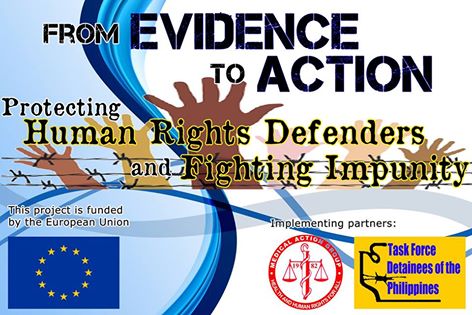
December 10, 2014
Press release
Human rights groups urge the government to lead the way in the protection of human rights defenders in the ASEAN region
The Medical Action Group (MAG) and Task Force Detainees of the Philippines (TFDP) urge the government to lead the way in the protection and defense of human rights defenders in the ASEAN region through enactment of a law on the protection of human rights defenders and conduct a comprehensive legislative audit in order to review and repeal laws which criminalize their work.
In a statement, “the Philippines should ensure that the leadership it shows in terms of promotion of human rights in the ASEAN is reflected in our national laws,” MAG and TFDP said.
Based on documentation of the MAG and TFDP, it is increasingly well documented that the use of laws to impede the activities of human rights defenders and to criminalize them is alarming.
“We have faced significant challenges on the field that in many cases, complaints by human rights defenders about alleged violations of their rights are not investigated or are dismissed without justification. For instance, the case of Antonio L. Tolentino, human rights defender and barangay chairperson of Barangay Hacienda Dolores in Porac, Pampanga, he is in detention since April this year due to lack of competent investigation into the charges filed by the private security agency employed by ,” Edeliza P. Hernandez, MAG Executive Director said.
Further, Emmanuel C. Amistad, TFDP Executive Director, said that it is disconcerting to know the arrest and detention of Jose Aaron Pedrosa, Jr., lawyer and human rights defender, on November 25, 2014 in Mandaue City. He was charged with obstruction of justice while pleading to authorities to stop harassing the residents of Sitio Mahayag, Barangay Subang Daku, Mandaue City. These acts of intimidation and harassment only shows the inadequacy of laws to support the work of human rights defenders and serving to further erode any confidence in our judicial system.
Human rights defenders play a crucial role in exposing and seeking accountability for human rights violations both by government and corporations. Their work is crucial to transparency, good governance and justice for victims.
The MAG and TFDP are currently implementing 3-year project, “Use of Evidence Based Approach to Human Rights Documentation and Monitoring for the Protection of Human Rights Defenders and their Families, and in the Fight Against Impunity”, worth Php 25 million supported by the European Union (EU) under its European Instrument for Democracy and Human Rights (EIDHR), to provide support for and strengthen protection of human rights defenders and their families.
The provision of medical and psychological services including temporary shelter, and legal support to human rights defenders at risk and their families, as they participate in long, extremely difficult and for some reason, dangerous legal proceeding, have resulted in providing adequate protection for them to pursue legal remedies.
“We continuously ensure efforts have been made to cooperate with the UN system and human rights mechanisms with a mandate to protect human rights defenders wherein the United Nations Human Rights Council in its 27th session on August 27, 2014 (A/HRC/27/38, August 27, 2014, Human Rights Council, 27th session Agenda items 2 and 5) included in its agenda the intimidation and harassment against Jun Sapanghari, human rights defender in Bukidnon, killings of land rights defenders Elisa Tulid in Quezon province, Sixto Bagasala Jr. in Malabon City and Julieto Lauron in Bukidnon,” MAG and TFDP both said.
It is, however, regrettable that despite repeated calls by international human rights organizations and members of the diplomatic community, the Philippines have yet to act on enactment of specific law on the protection of human rights defenders.
“We call on the government to provide the basis for a safe and enabling environment for human rights defenders like Brgy. Captain Tolentino, Atty. Pedrosa among others and take all steps to end restrictions against them,’ MAG and TFDP both concluded.
House Bill No. 1472 , “Human Rights Defenders Protection Act of 2013” could assist not only to provide formal legal protection to the work of human rights defenders, but also to give official recognition to the legitimacy of such work, educate authorities, public officials and the public at large about the importance of human rights defenders and the protection thereof.-end-
BACKGROUND
The MAG and TFDP are currently implementing 3-year project worth Php 25 million supported by the European Union (EU) under its European Instrument for Democracy and Human Rights (EIDHR), to provide support for and strengthen protection of human rights defenders and their families.
The title of the project is “Use of Evidence Based Approach to Human Rights Documentation and Monitoring for the Protection of Human Rights Defenders and their Families, and in the Fight Against Impunity”.
The prevention of torture and the rehabilitation of torture victims has been one of the priorities for funding under the EIDHR which, since 2006, has provided more than € 6 million (or Php 360 million) to support civil society’s efforts to address various human rights issues in the Philippines.
Under its bilateral cooperation, the EU also provides significant resources and technical assistance for the protection of human rights. Through the EU-Philippines Justice Support Programme (EPJUST), it notably cooperates with the various stakeholders of the criminal justice system to reinforce their capacities to ensure the conviction of perpetrators of major human rights violations such as extra-legal killings, enforced disappearances, and torture.
In the future, the EU will increase its support to the Commission on Human Rights and to civil society for better human rights protection.

